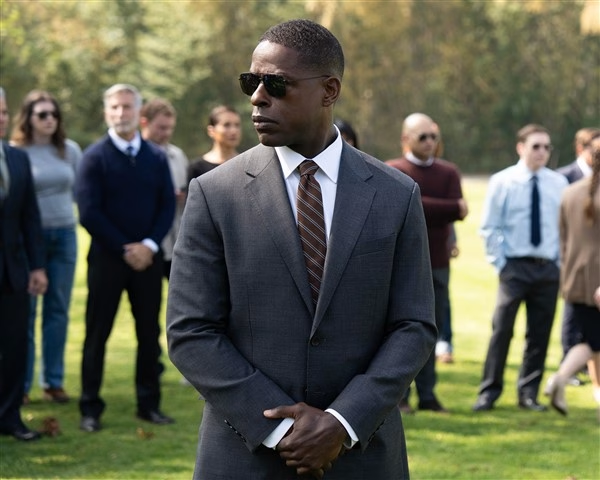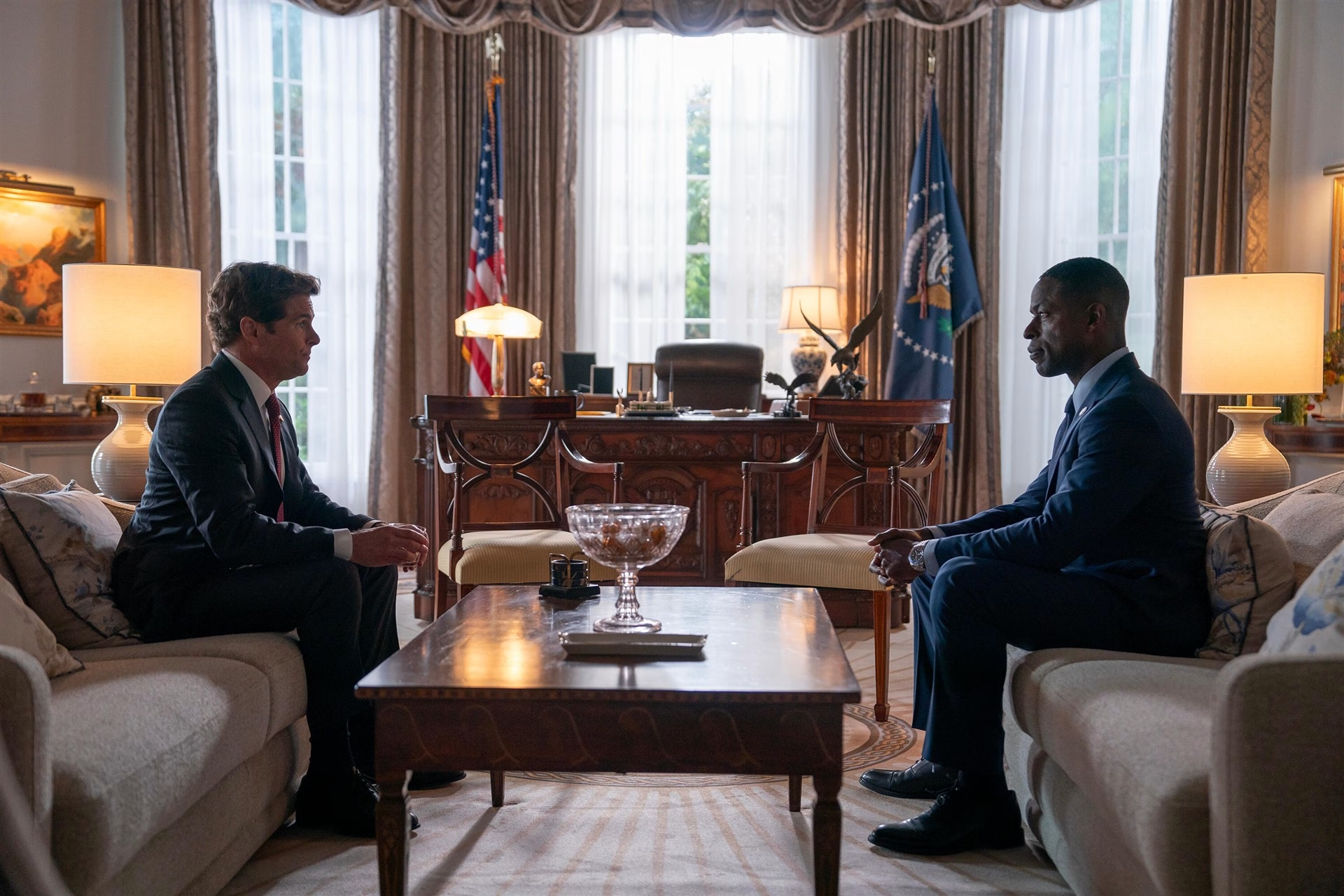Paradise
Created by Dan Fogelman
New episodes premiere Thursdays on Hulu
7 episodes watched for review
Paradise, Hulu’s new high-concept drama from This Is Us creator Dan Fogelman, is a television series with a big twist – but it’s not the one you think it is. Advertised as a dramatic thriller about political espionage and intrigue, Paradise is a series with much wider, high-minded ambitions; though its first 30 minutes appear to be some mix of 24 and The Diplomat, Paradise quickly reveals itself to actually be a science fiction series inside of a political thriller, a weird bastard child of Silo, Wayward Pines and… surprisingly, This Is Us itself, complete with convoluted timelines and unnecessary mysteries.
Across the seven episodes I’ve seen (Hulu did not make the season finale available before release) it’s a mix that really doesn’t work; save for the considerably rare moment of clarity, Paradise mostly stumbles through its first season as an incongruous mix of convoluted (yet incredibly predictable) murder mystery, absent-minded science fiction, and saccharine personal tragedy, a creative misfire that isn’t nearly interesting or inventive enough of a failure to be memorable, and trades in too many cliches and stunted attempts at character to smooth over its most glaring issues.
(…EXCEPT, when it does work. The show’s seventh episode, which I will discuss in more detail after release, suggests a completely different, more engrossing and horrifying series. Update: here’s a link to the aforementioned review of “The Day”.)

Paradise begins in rather straightforward fashion, and tries to draw the audience’s bluff with a big twist in the pilot’s first act – the death of President Cal Bradford (James Marsden), which kicks off a story of political espionage and personal strife, centered on Bradford’s top special agent, Xavier Collins (Sterling K. Brown, who also executive produces alongside Fogelman). It involves an expectedly conflicted group of players; romantically involved agents with hidden agendas (Jon Beavers and Nicole Brydon Bloom), powerful billionaires enacting their influence (Julianne Nicholson and Gerald McRaney) – and of course, lots of visual and audio cues to suggest that Something Bigger is going on with the murder at the heart of the series.
Alongside that is the story of Collins, special agent and widow trying to raise his two kids; these stories are intertwined, and delivered in a similar fashion to Fogelman’s previous series, layering flashbacks and plot lines over each other like narrative sfogliatelle. It’s a mix that didn’t work for me in This Is Us, but at least it made more sense there, as a fractured reconstruction of a family timeline across generations; across Paradise‘s first season, each episode overindulges in this format haphazardly, which leave its many concurrent and/or parallel storylines as underdeveloped fragments, only connected by the consistency of the performances across each episode.

It doesn’t help that when Paradise does slow down for long conversations (either plot or character-focused), it becomes nearly unwatchable, a collection of cliched interactions and ideas that betray a certain simplicity to the supposedly complex conspiracy at the heart of the post-apocalyptic shelter the series takes place in. Characters, in the past and present, are consistently engaged in long scenes where subtext, often focused on the obscurity of truth and how our emotional perceptions further cloud them, becomes nakedly obvious, the kind of delivery where one can feel the writer’s room talking to the audience through pointed, trite dialogue – it often reminds me of post-LOST series like The Event or Flash/Forward, shows addicted to mystery and conflict, leaning on cliche for resolution and obscurity and randomness for dramatic propulsion (another great example of this; La Brea!).
Throw in some other unsavory elements – like a pair of extremely bad teen-focused storylines, similar to just about every aforementioned series, and a whole lot of cringey dialogue trying to reach the saccharine emotional crescendos that made This Is Us such a big hit – and it’s no surprise why none of the show’s first episodes feel like they come together (the show’s seventh, which focuses on the big reveals of what happened the day of the big series-defining apocalyptic event, offers a glimpse of something more engaging and rewarding). But none of these parts really fit together, at least not in the current form of their delivery; Paradise relies too heavily on its incredibly noisy, disruptive score (where nearly EVERY SINGLE EPISODE ends with a whiny, moody remake of late 20th century pop songs, like it’s a fucking video game trailer) and an assumed sense of self importance that’s never earned through its stories, characters, or its numerous attempts at dramatic “twists” (including one in the fourth episode that is incredibly groan-worthy).
(Did I mention there’s a therapist in the main ensemble, which means we are subjected to numerous Therapy Scenes throughout the season? There is!)

What makes it so frustrating, and disappointing, is the part of the formula that works; in each of the show’s episodes, there is a two or three minute scene contending with much larger, more ambitious ideas filtered through one of the show’s main players (in this strange way, this series reminds me a bit of Devs). In these moments, Paradise contends with everything from our perception of memory, to Oppenheimer-esque considerations of humanity and its poignant horrors… in these moments, Paradise offers glimpses of a series it can’t become (at least in this first batch of episodes), because it is buried underneath scene after scene of exposition, narrative subterfuge, and whatever bread crumb of information our protagonists chase for 50+ minutes, before the episode ends by teasing something else completely out of context.
(And again… that seventh episode. Don’t worry – I’ll have plenty to say about it when it releases).
Paradise is a maddening series; with such strong lead performances and one really strong early episode (the show’s second, “Sinatra”)it seemed an easy proposition for the series to be, at the very least, one of the most entertaining empty-brain series of the still-young 2025 TV season. Instead, Paradise is unfortunately sterile, even in this regard: its only attempts to diversify from superficial plot mechanics and extremely mediocre character moments are odd attempts at humor or grasps at self-importance, none of which make for an exciting, propulsive – or most importantly, a consistently satisfying series (this could change with the finale, of course, but I’m not holding my breath).
Grade: D
Discover more from Processed Media
Subscribe to get the latest posts sent to your email.


